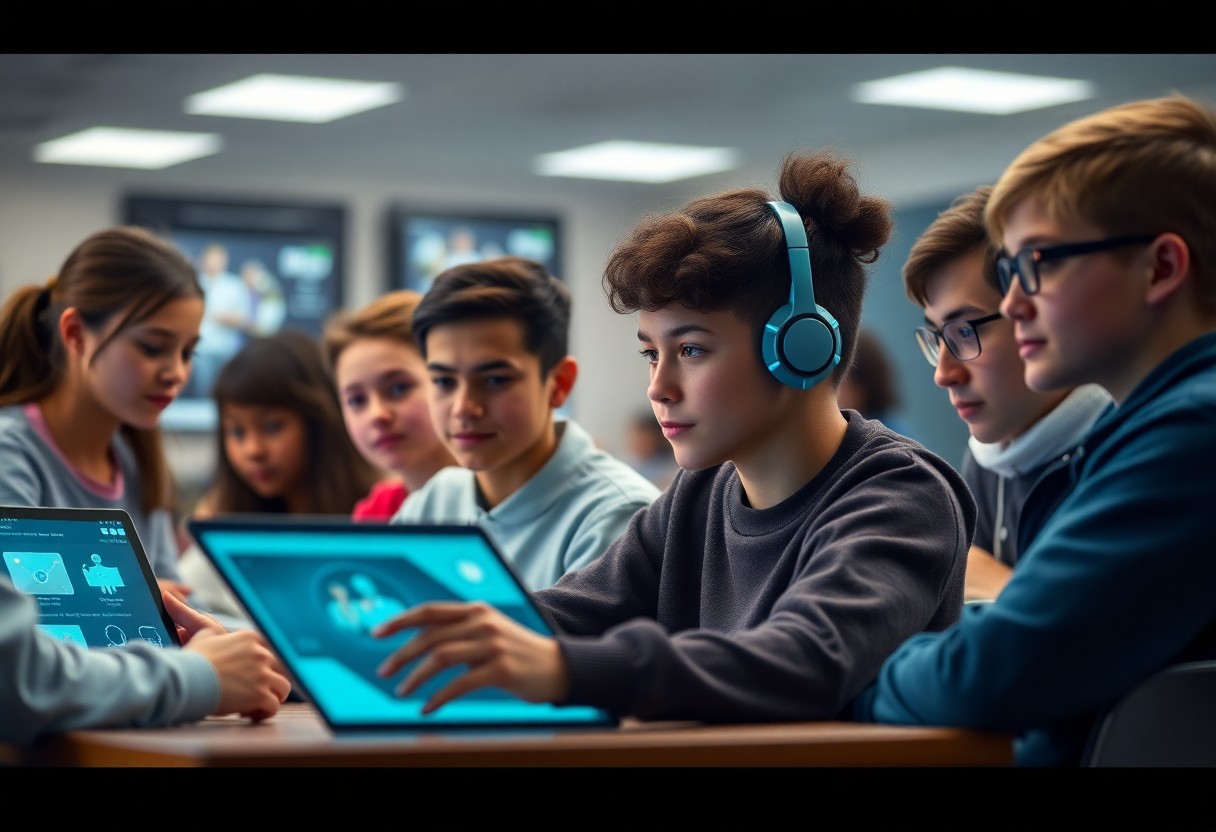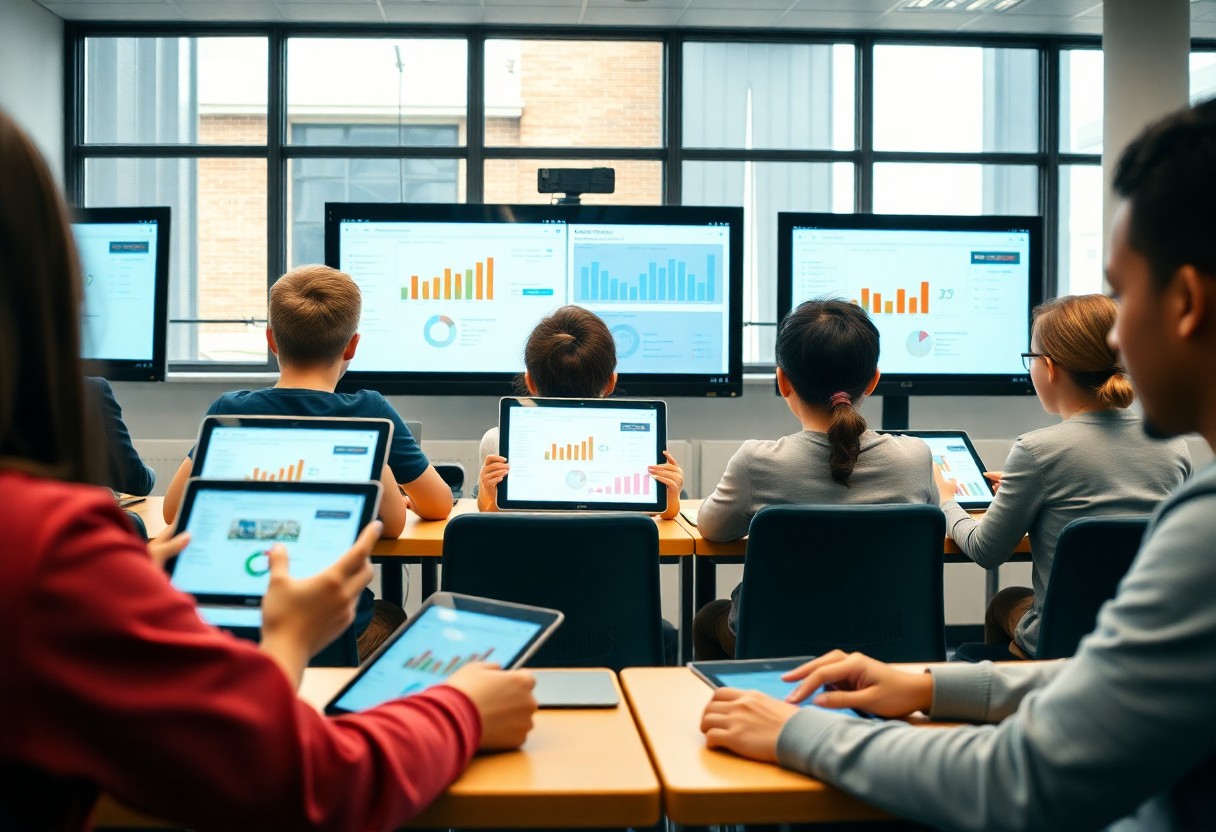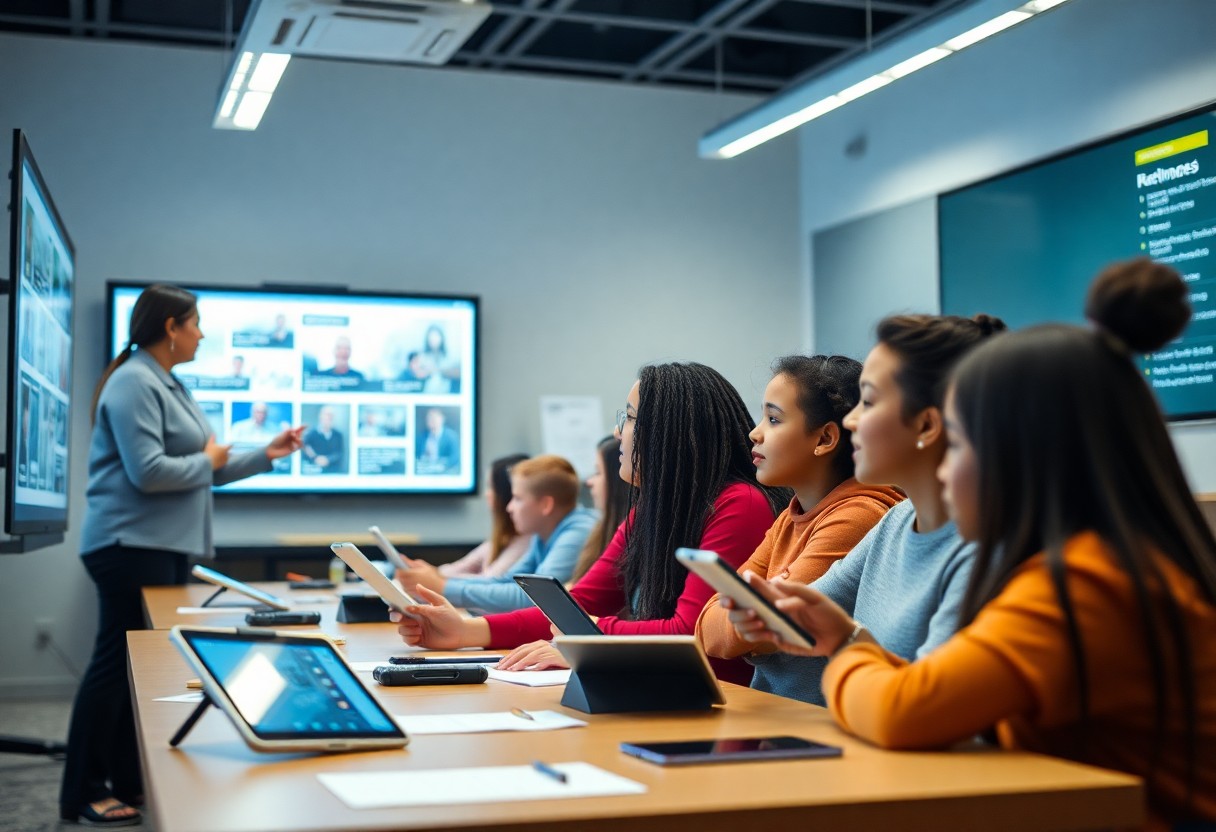Just imagine a world where AI is not just a buzzword, but a game-changer in education. In this blog post, we investigate into the fascinating realm of educational games and simulations powered by artificial intelligence. From personalized learning experiences to real-time feedback, the potential of AI in education is nothing short of revolutionary. Join us as we explore how AI is redefining the way we learn and interact with educational content.
The Evolution of Educational Technology
From Chalkboards to Computers
Evolution in educational technology has been a fascinating journey, transforming traditional classroom settings through the integration of innovative tools. From simple chalkboards where teachers conveyed lessons to students, the introduction of computers revolutionized the way information was shared. These technological advancements paved the way for a more interactive and engaging learning experience.
The Rise of Gamification and Simulation
One of the most significant developments in educational technology has been the rise of gamification and simulation. By incorporating game elements and virtual simulations into educational activities, technology has made learning more enjoyable and effective. Students are now able to engage with course material in a dynamic way, enhancing their understanding and retention of key concepts.
Technology in educational games and simulations has provided unique opportunities for personalized learning experiences, instant feedback, and adaptive learning paths. This has empowered educators to cater to diverse learning styles and enhance the overall quality of education.
The AI Revolution in Education
Little did we know that the future of education would be revolutionized by artificial intelligence. The integration of AI in educational games and simulations has opened up a world of possibilities, transforming the way students learn and educators teach.
Personalized Learning Experiences
For students, personalized learning experiences are now within reach, thanks to AI. These technologies have the ability to adapt to each student’s individual needs, providing custom-tailored lessons and feedback. By analyzing data on a student’s performance and learning style, AI can create a unique educational journey that maximizes their potential and helps them succeed.
Intelligent Tutoring Systems
With intelligent tutoring systems, teachers can provide more personalized support to students, even in large classroom settings. These AI-powered systems use data-driven insights to offer real-time feedback, quizzes, and recommendations to enhance the learning process. By identifying areas where students are struggling, the system can intervene proactively, offering additional resources or guidance to help them overcome challenges.
A significant advantage of Intelligent Tutoring Systems is their ability to track each student’s progress continuously and adjust the learning path accordingly. This not only improves academic performance but also boosts students’ confidence and motivation by offering support precisely when needed.
Enhancing Engagement and Motivation
Clearly, one of the key benefits of incorporating AI into educational games and simulations is the ability to enhance engagement and motivation among learners. By utilizing interactive storytelling and immersive environments, students are transported into a world where learning becomes an exciting adventure.
Interactive Storytelling and Immersive Environments
For students, learning can sometimes feel mundane and disconnected from real-life experiences. However, through the use of AI, educational games and simulations can offer interactive storytelling and immersive environments that immerse learners in compelling narratives and scenarios. This not only captures their attention but also motivates them to actively participate in their own learning journey.
Real-time Feedback and Assessment
Any educator will tell you that timely feedback is crucial for student learning and development. With AI technology embedded in educational games and simulations, learners receive real-time feedback on their performance, allowing them to track their progress and make improvements instantly. This personalized assessment not only keeps students engaged but also enhances their learning outcomes.
With real-time feedback and assessment, educators can identify learning gaps quickly and tailor their teaching strategies to meet the individual needs of each student. This customized approach to learning not only boosts student engagement and motivation but also promotes a deeper understanding of the subject matter.

Developing Critical Thinking and Problem-Solving Skills
Now, let’s probe into how AI-driven educational games and simulations can foster critical thinking and problem-solving skills in learners.
AI-driven Simulations and Virtual Labs
One of the most significant benefits of using AI in educational games and simulations is its ability to create dynamic and adaptive learning environments. These tools can present students with complex problems that adapt to their skill level, keeping the challenges relevant and engaging. Through trial and error in a safe virtual space, learners can develop their critical thinking skills by analyzing situations, making decisions, and facing the consequences of their choices in real-time.
Collaborative Learning and Teamwork
Collaborative learning is a key component of many educational games and simulations powered by AI. Students can work together in teams, communicating, negotiating, and sharing ideas to solve problems collectively. This not only enhances their problem-solving skills but also fosters important interpersonal skills such as teamwork, leadership, and conflict resolution.
A collaborative learning environment facilitated by AI encourages students to learn from each other’s perspectives and leverage their diverse strengths to achieve a common goal. This interactive approach not only makes learning more engaging but also prepares learners for the collaborative dynamics they will encounter in future academic and professional settings.
The Role of AI in Special Education
Not only does Artificial Intelligence (AI) hold incredible potential in transforming traditional education, but it also plays a crucial role in special education. AI-powered tools and technologies have the ability to revolutionize the way students with disabilities learn and interact with educational content.
Adaptive Learning for Students with Disabilities
Role Adaptive learning platforms powered by AI can cater to individual student’s specific needs, providing personalized learning experiences that are tailored to their unique strengths and challenges. For students with disabilities, this can be a game-changer, as these platforms can adapt in real-time to accommodate different learning styles and paces.
Accessible and Inclusive Educational Tools
Learning AI can also play a significant role in creating educational tools and resources that are accessible and inclusive for students with disabilities. By leveraging AI technologies, developers can ensure that educational games, simulations, and other digital learning materials are designed with features that support diverse learning needs.
Understanding These inclusive tools not only empower students with disabilities to actively engage in learning but also promote a more supportive and accommodating learning environment. By harnessing the power of AI in education, we can work towards building a more inclusive society where every individual has equal opportunities to learn and succeed.
The Future of Teacher Training and Development
Unlike traditional forms of teacher training and development, the future holds a myriad of possibilities with the integration of AI technology. Educators are poised to benefit from personalized, efficient, and innovative methods that can enhance their skills and effectiveness in the classroom.
AI-assisted Professional Development
With AI-assisted professional development, teachers can receive personalized feedback and recommendations based on their individual teaching styles and student outcomes. This targeted approach allows educators to focus on areas that need improvement, leading to more impactful teaching practices. Additionally, AI can help analyze data from educational games and simulations to provide insights on student performance and engagement, guiding teachers in making data-driven decisions.
Virtual Coaching and Mentoring
Coaching and mentoring are imperative components of teacher development, and AI is revolutionizing this aspect through virtual platforms. Virtual coaching and mentoring provide educators with opportunities for guidance and support from experienced teachers and mentors, regardless of their location. This convenient and flexible approach enables continuous professional growth and mentorship for teachers at all stages of their careers.
For instance, through virtual coaching, teachers can engage in role-playing scenarios, receive real-time feedback, and access resources tailored to their needs. This interactive and personalized form of coaching enhances teacher skills and confidence, ultimately benefiting the learning experiences of their students.
Addressing the Digital Divide and Equity Issues
Many challenges persist in ensuring equitable access to AI-powered educational resources. The digital divide exacerbates disparities among students, with those in underserved communities facing limited access to technology and internet connectivity. Efforts are needed to close this gap and provide all learners with the opportunity to benefit from the advantages of AI in education.
Access to AI-powered Educational Resources
Efforts to address the digital divide include initiatives to provide students with necessary technology tools, such as laptops or tablets, and ensuring high-speed internet access. Additionally, partnerships between schools, government agencies, and tech companies can help make AI-powered educational resources more accessible to all students, regardless of their socioeconomic background.
Bridging the Gap between Urban and Rural Education
The disparity in access to AI-powered educational resources is not only limited to urban settings but also extends to rural areas. The lack of infrastructure and resources in rural schools often hinders the implementation of advanced technologies like AI. In addressing these challenges, a comprehensive approach that considers the unique needs of rural communities is vital to ensure that all students have equal opportunities to engage with AI in education.
Ensuring Accountability and Transparency
Once again, the integration of AI in educational games and simulations brings to the forefront the importance of accountability and transparency. As these technologies become more prevalent in educational settings, it is crucial to establish clear guidelines and mechanisms to ensure that the use of AI is ethical, unbiased, and effective in enhancing learning outcomes.
AI-driven Assessment and Evaluation
Ensuring accountability in AI-driven assessment and evaluation involves closely monitoring the algorithms used to measure student performance and learning progress. Educational institutions must regularly evaluate these systems to prevent any bias or inaccuracies that could impact students’ educational journey. Transparency in the assessment process is key to building trust and confidence in AI technologies among educators, students, and parents.
Data-Driven Decision Making
Data-driven decision making in educational games and simulations relies on the analysis of student performance metrics, learning patterns, and engagement levels. This approach allows educators to tailor their teaching methods to meet the individual needs of students, ultimately improving the overall learning experience. By leveraging AI-generated insights, educators can make more informed decisions that positively impact student outcomes.
Plus, data-driven decision making can help identify at-risk students who may need additional support, optimize learning pathways for different learning styles, and enhance the overall effectiveness of educational interventions. By harnessing the power of AI in educational games and simulations, educators can unlock new possibilities for personalized learning and student success.
The Ethics of AI in Education
Bias and Fairness in AI Systems
After the integration of AI into educational games and simulations, the issue of bias and fairness in AI systems becomes a critical concern. AI systems are only as unbiased as the data they are trained on, which can perpetuate existing inequalities and prejudices. It is crucial for developers to actively mitigate bias by regularly auditing algorithms and datasets to ensure fair and equitable outcomes for all students.
Privacy and Security Concerns
One of the significant concerns surrounding the use of AI in education is the potential for privacy breaches and security vulnerabilities. AI systems often collect and analyze vast amounts of sensitive student data, raising questions about who has access to this information and how it is being used. Educators and developers must prioritize data protection measures and transparent data usage policies to build trust with students and parents.
Besides data privacy issues, security vulnerabilities in AI systems can lead to unauthorized access to student information, posing risks of identity theft and misuse of personal data. It is imperative for educational institutions to invest in robust cybersecurity measures to safeguard student data from malicious attacks.
Overcoming Implementation Challenges
Integrating AI into Existing Curricula
For educators looking to incorporate AI into their existing curricula, there are several challenges to consider. One of the main hurdles is the resistance to change from both teachers and students. Implementing AI technology requires a shift in teaching methods and learning approaches, which can be daunting for those accustomed to traditional educational practices.
Teacher Buy-in and Training
Any successful integration of AI in educational games and simulations hinges on teacher buy-in and adequate training. Teachers must be equipped with the knowledge and skills to effectively utilize AI tools in the classroom. Providing comprehensive and ongoing training can help alleviate any concerns or hesitancies teachers may have about incorporating AI into their teaching practices.
Curricula: Educators must ensure that AI integration aligns with the learning objectives of the curricula while also enhancing student engagement and learning outcomes. Involving teachers in the curriculum design process can help foster buy-in and ensure that AI tools are effectively integrated into existing lesson plans.
The Potential for AI to Enhance Soft Skills
Social-Emotional Learning and Emotional Intelligence
Intelligence AI has the potential to revolutionize social-emotional learning and the development of emotional intelligence in educational games and simulations. By utilizing AI algorithms, these tools can adapt to the emotional responses and behaviors of individual students, providing personalized feedback and guidance. This level of customization can help students better understand and regulate their emotions, improve empathy and interpersonal skills, and enhance their overall emotional intelligence.
Developing Creativity and Entrepreneurial Spirit
For entrepreneurs and creative thinkers, AI-powered educational games and simulations offer a unique platform for honing skills and fostering innovation. Through interactive challenges and real-world scenarios, students can develop critical thinking, problem-solving abilities, and the resilience needed to navigate the complexities of entrepreneurship. AI can provide instant feedback, suggest alternative strategies, and simulate various business environments, preparing students for the challenges they may face in their future endeavors.
Emotional The integration of AI in educational games and simulations not only enhances soft skills but also provides a safe and supportive environment for students to explore and develop their creativity and entrepreneurial spirit. By offering realistic scenarios and interactive experiences, AI can empower students to think outside the box, take risks, and embrace new ideas, ultimately fostering a culture of innovation and resourcefulness.
The Global Impact of AI in Education
Cross-Cultural Exchange and Collaboration
An imperative aspect of AI in education is its ability to facilitate cross-cultural exchange and collaboration. Through AI-powered educational games and simulations, students from different parts of the world can come together virtually to work on projects, solve problems, and learn from one another’s perspectives. This level of interconnectedness helps break down cultural barriers, fosters understanding, and promotes a more inclusive learning environment. Students not only gain knowledge in their subject areas but also develop important skills such as empathy, communication, and teamwork.
Preparing Students for a Global Workforce
Preparing students for a global workforce is a crucial goal of integrating AI into education. AI-powered simulations can provide students with real-world scenarios and challenges that mimic the complexities of today’s global economy. By engaging with these simulations, students can develop critical thinking skills, cultural intelligence, and adaptability – all of which are highly valued in the workplace. Furthermore, exposure to diverse perspectives and experiences through AI can better equip students to navigate an increasingly interconnected world.
This shift in educational methodologies not only benefits students individually but also has broader implications for the global workforce. By preparing students with the necessary skills and mindset to thrive in diverse working environments, AI in education is shaping a generation of future leaders who are equipped to tackle complex challenges on a global scale.
The Economic Benefits of AI in Education
Increased Productivity and Efficiency
Your educational institution can experience a significant boost in productivity and efficiency with the integration of AI in educational games and simulations. By leveraging AI technology, educators can create personalized learning experiences for students, allowing them to learn at their own pace and focus on areas where they need the most help. This individualized approach not only enhances student engagement but also maximizes learning outcomes.
Cost Savings and Resource Allocation
On top of increased productivity, AI in education can lead to substantial cost savings and optimized resource allocation. With AI-powered systems automating administrative tasks such as grading, scheduling, and student progress tracking, educational institutions can reallocate human resources to more complex and strategic roles. This shift not only reduces the operational costs but also improves overall efficiency by freeing up educators’ time to focus on student interactions and teaching quality.
Resource allocation is optimized as AI can analyze data to identify areas where resources are most needed, whether it’s additional support for struggling students or investment in specific learning tools. This data-driven approach ensures that resources are allocated where they can have the most significant impact on student learning outcomes, ultimately maximizing the return on investment in education.
Final Words
With this in mind, it is clear that AI has the potential to revolutionize the way we approach education through games and simulations. By personalizing learning experiences, adapting to individual needs, and providing real-time feedback, AI can greatly enhance the effectiveness of teaching and learning. As technology continues to advance, we can expect to see even more innovative and interactive educational tools that harness the power of AI to create engaging and impactful learning experiences for students of all ages.
FAQ
Q: What is the role of AI in educational games and simulations?
A: AI plays a crucial role in creating personalized learning experiences, adapting to students’ needs, and providing real-time feedback.
Q: How can AI enhance the learning process in educational games?
A: AI can analyze students’ actions, identify learning patterns, and tailor the gameplay to suit individual learning styles, making the experience more engaging and effective.
Q: What are the benefits of using AI in educational games and simulations?
A: AI can increase student engagement, improve critical thinking skills, promote problem-solving abilities, and enhance overall learning outcomes.
Q: Can AI help educators track students’ progress in educational games?
A: Yes, AI algorithms can track students’ performance, monitor their progress, and provide valuable insights to educators for more targeted instruction.
Q: How does AI adapt to different learning styles in educational games?
A: AI uses adaptive learning algorithms to analyze each student’s interactions with the game and adjust the difficulty level, content, and pace to match their unique learning preferences.
Q: Are there any ethical concerns regarding the use of AI in educational games and simulations?
A: Some ethical concerns include data privacy issues, algorithm bias, and the potential for over-reliance on technology in the learning process. It is crucial to address these concerns through proper regulation and oversight.
Q: What does the future hold for AI in educational games and simulations?
A: The future of AI in educational games is promising, with advancements in natural language processing, machine learning, and predictive analytics, opening up new possibilities for personalized and immersive learning experiences.




